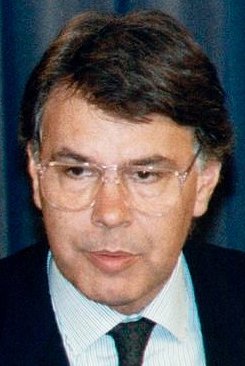Related Research Articles

Democratic and Social Centre was a liberal political party in Spain, founded in 1982 by former Prime Minister Adolfo Suárez. The party was a member of the Liberal Democratic and Reformist Group in the European Parliament and the Liberal International. In 2006, most of its remaining members merged into the People's Party, though a reduced faction continued the party, which won some seats in the 2007 local elections.

National Democracy is a far-right political party in Spain, founded in 1995. It is modelled on the National Rally (RN) of France, and grew indirectly out of several defunct parties like the Spanish Circle of Friends of Europe (CEDADE) group and Juntas Españolas. Until 2018, its leader was Manuel Canduela Serrano, a former member of Acción Radical, a group active in the Valencian Community. He was also a vocalist in the so-called "identity" rock group Division 250. The party's current leader is Pedro Chaparro.

The 2007 Spanish local elections were held on Sunday, 27 May 2007, to elect all 66,131 councillors in the 8,111 municipalities of Spain and all 1,038 seats in 38 provincial deputations. The elections were held simultaneously with regional elections in thirteen autonomous communities, as well as local elections in the three foral deputations of the Basque Country and the eleven island councils in the Balearic and Canary Islands.

The Republican Social Movement was a far-right political party in Spain. It was registered at the Ministry of Interior on November 30, 1999, with offices in Barcelona. The following year it merged with Vértice Social Español to form what it called a "Social Patriotic Force".

The 1979 Spanish local elections were held on Tuesday, 3 April 1979, to elect all 67,505 councillors in the 7,870 municipalities of Spain and all 1,152 seats in 43 provincial deputations. The elections were held simultaneously with local elections in the four foral deputations of the Basque Country and Navarre and the ten island councils in the Balearic and Canary Islands.

Regional elections were held in Spain in 1983 to elect the regional parliaments of thirteen of the seventeen autonomous communities. 764 of 1,139 seats in the regional parliaments were up for election. The 6 May 1983 elections were held simultaneously with local elections all throughout Spain.

People's Party was a Spanish liberal conservative political party, founded in 1976. The leaders of the PP were Pío Cabanillas Gallas and José María de Areilza.

The 1991 Spanish local elections were held on Sunday, 26 May 1991, to elect all 66,308 councillors in the 8,060 municipalities of Spain and all 1,032 seats in 38 provincial deputations. The elections were held simultaneously with regional elections in thirteen autonomous communities, as well as local elections in the three foral deputations of the Basque Country and the ten island councils in the Balearic and Canary Islands.

The 1999 Spanish local elections were held on Sunday, 13 June 1999, to elect all 65,201 councillors in the 8,104 municipalities of Spain and all 1,034 seats in 38 provincial deputations. The elections were held simultaneously with regional elections in thirteen autonomous communities, as well as local elections in the three foral deputations of the Basque Country, the ten island councils in the Balearic and Canary Islands and the 1999 European Parliament election.
The Democratic Party was a Spanish political party created in 1879 by former Emilio Castelar as a split from the Federal Democratic Republican Party to contest the Spanish general election held in the same year. In 1884 it was renamed as the Possibilist Democratic Party.
The Democratic Progressive Party was a Spanish political party created in 1879. It was joined by elements from the Republican Reformist Party, led by Cristino Martos, ahead of the 1879 Spanish general election.
The Dynastic Left was a Spanish political party founded in 1881 by elements from the Liberal Fusionist Party and the Democratic Progressive Party.

This is the results breakdown of the European Parliament election held in Spain on 10 June 1987. The following tables show detailed results in each of the country's 17 autonomous communities and in the autonomous cities of Ceuta and Melilla.

This is the results breakdown of the European Parliament election held in Spain on 15 June 1989. The following tables show detailed results in each of the country's 17 autonomous communities and in the autonomous cities of Ceuta and Melilla.

The Greens–Green Group, founded in 1994 as Green Group, is a green political party in Spain. It is a founding member of the Roundtable for the Unity of the Greens in Spain. It was created as an electoral list in the 1994 European Parliamentary Elections. Since its creation, its spokesperson has been Esteban Cabal. It is not part of the European Green Party, and should not be confused with the EGP's previous representative in Spain, the Confederation of the Greens.

Republican Popular Unity was a Spanish electoral candidacy formed to contest the 1986 general election by the Communist Party of Spain (Marxist–Leninist) and Republican Convention of the Peoples of Spain (CRPE).
Alliance for the Republic was a Spanish electoral alliance formed to contest the 1989 general election by the Internationalist Socialist Workers' Party (POSI) and Socialist Democratic Alliance (ADS). In 1992, the member parties of AxR, POSI and ADS, joined the Socialist Democracy party (DS) into the Coalition for a New Socialist Party (CNPS).
Coalition for a New Socialist Party was a Spanish electoral alliance formed to contest the 1993 general election by the Internationalist Socialist Workers' Party (POSI), Socialist Democratic Alliance (ADS) and Socialist Democracy (DS). It contested the 1993 general election, the 1994 European Parliament election and several regional elections held throughout 1994 and 1995, as well as the 1992 Catalan parliamentary election under the Independent Socialists label.
The People's Democratic Party was a Spanish political party of liberal centre, integrated in the Union of the Democratic Centre (UCD). Its president was Fernando Chueca, and his Secretary General was Ignacio Camuñas.

The Social Democratic Party of Catalonia was a political party in Catalonia, led by Jaume Casanovas and defining itself as left liberal, that split from Democratic Left of Catalonia (EDC) in April 1976 over leadership rather than ideological disagreements. The party would join the Spanish Social Democratic Federation of Francisco Fernández Ordóñez and José Ramón Lasuén.
References
- ↑ "Partido Liberal Conservador 1868-1931". historiaelectoral.com (in Spanish). Electoral History. Retrieved 26 December 2016.
- ↑ "Cortes Election 4 April 1886". historiaelectoral.com (in Spanish). Electoral History. Retrieved 24 September 2017.
- ↑ "Graphs and analysis: Elections in the Revolutionary Sexennium and the Restoration 1869-1923". historiaelectoral.com (in Spanish). Electoral History. Retrieved 24 September 2017.